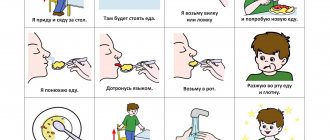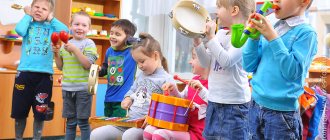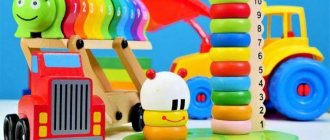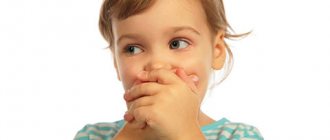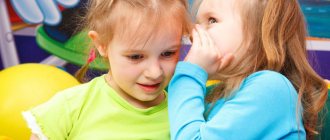Speech and its role in the development of a child; educational and methodological material on the topic
Speech and its role in child development
Mastery of the native language and speech development is one of the most important acquisitions of a child in preschool childhood and is considered in modern preschool education as the general basis for the upbringing and education of children.
Speech, in all its diversity, is a necessary component of communication, during which it is, in fact, formed. The most important prerequisite for improving the speech activity of preschool children is the creation of an emotionally favorable situation that promotes the desire to actively participate in verbal communication. The development of speech is closely related to the formation of the child’s thinking and imagination.
With normal development in children of senior preschool age, independent speech reaches a fairly high level: when communicating with adults and peers, they demonstrate the ability to listen and understand spoken speech, maintain a dialogue, answer questions and ask them independently. The ability to compose simple stories, but interesting in their semantic load and content, to construct phrases grammatically and phonetically correctly, and to compose their content compositionally, contributes to children’s mastery of monologue speech, which is of priority importance for the child’s full preparation and schooling. In preschool age, a child’s vocabulary is constantly increasing, but its qualitative transformation is entirely mediated by the participation of adults.
Speech performs a wide variety of functions in human life - communication, transmission of the experience accumulated by mankind, regulation of behavior and activity. All functions of speech are interconnected: they are formed through each other and function in one another. In order for these functions to appear in a timely manner and be fully implemented, appropriate conditions are necessary. When a child first begins to speak, he often has difficulty using his speech to organize communication. It is simply impossible to convey to him the experience of previous and current generations (in the form of knowledge, skills and abilities) with the help of words, without visual and effective support. As a regulator of the child’s activity, speech also functions very limitedly during this period. In order to fulfill all its functions, speech goes through a complex and long path of development, closely connected with the general mental development of the child - the enrichment of his activity, perception, thinking, imagination, emotional-volitional sphere.
In general, the speech development of a preschooler undergoes the following changes:
1. It is carried out in two directions:
a) social – its practical use is improved in the process of communication with adults and peers;
b) semantic - speech becomes the basis for the qualitative transformation of mental processes and turns into a tool of thinking.
2. There are two stages that naturally replace each other:
a) passive mastery of words, when a child understands speech addressed to him, but does not yet know how to speak;
b) active use of speech.
In order for speech to serve as a means of communication, conditions are necessary that encourage the child to consciously turn to the word, forming the need to be understood first by adults, and then by peers. Such conditions arise, first of all, in the process of communication itself and activities organized by adults together with the child. With the correct organization of a child’s entire life and activity, speech already at an early age becomes the main means of communication. Of course, the baby understands only part of the words and not all grammatical structures, but it is speech that attracts his attention to objects and actions, its emotional tone determines the mood and direction of communication. If there is a lack of communication at an early age, its limitation, poverty, lack of saturation, it will be difficult for a child to learn to communicate with children and other people; he may grow up uncommunicative and withdrawn.
Parents must understand that language is the main subject in education, understand the importance of their own role and responsibility in the development of their child’s language. Familiarizing children with their surroundings and expanding their vocabulary occurs not only in the learning process. Everyday activities (eating, dressing) provide great opportunities for enriching and expanding vocabulary. The work activity of the child and his ability to participate in family life are extremely important for the development of vocabulary. Children understand the meaning of many words; the nature of work communication contributes to the child’s use of acquired words and consolidation of them in memory.
Every new event in the life of a family - a trip to the village to visit grandmother, a visit to the theater, a museum, moving to a new apartment, work in the garden, is a prerequisite for the child to acquire new skills, accumulation and activation of vocabulary for children.
Children with varying degrees of speech underdevelopment have great difficulty mastering the syntax of the language. This manifests itself in incorrect word agreement, errors in case endings of all grammatical categories, and incorrect phrase construction. In this case, parents need to tactfully point out the mistake to the child, without repeating it, and pronounce the option correctly, inviting the child to repeat it.
A very effective means of vocabulary work in the family is a game. An important factor for the development of a child’s speech is the participation of an adult (parents or older family members) in the game.
Children's vocabulary is also enriched in their creative activities, in the process of becoming familiar with art. Watching television programs and movies that are age-appropriate for children greatly expands children’s horizons and makes new words clear to them, thanks to the combination of sound and visual perceptions. Of great importance for the development of children’s speech is a conversation after watching a movie or a play, repetition of new words and expressions unfamiliar to the child.
Communication with peers in preschool age plays no less important role in the development of children than communication with adults. It also arises mainly in joint activities.
The first distinctive feature of contacts with peers is their particularly vivid emotional intensity. In communication between preschoolers and children, there are almost ten times more expressive facial expressions and bright expressive intonations than in communication between a child and an adult.
The second feature is the non-standard nature of children’s statements and the absence of strict rules. If an adult gives a child communication standards, teaches him to speak properly, like everyone else, then a peer creates the conditions for independent speech creativity.
The third feature is the predominance of proactive statements over reactive ones. In contacts with other children, it is much more important for a child to speak out himself than to listen to another.
The fourth difference is that communication with peers is much richer in its purpose and functions. By communicating with adults, the baby masters speech norms and learns new words and phrases. However, all these learned words, expressions, and rules may remain in the “passive storeroom” and not be used by the child in everyday life if the child does not need them. For passive, potential knowledge to become active, there must be a vital need for it. When talking to an adult, the child does not make any special effort to be understood. An adult will always understand him, even if the child’s speech is not very clear. Another thing is a peer. He will not try to guess the desires and moods of his friend. You need to tell him clearly and clearly: what you want, what you are not happy with, what you are going to do, what you like to play. And since children really want to communicate, they try to more coherently and clearly express their intentions, thoughts, and desires.
Preschoolers who do not have contact with peers experience significant difficulties in communicating with adults, despite an active desire to talk with them. Thus, for the full development of speech, it is necessary to communicate both with adults and with peers.
References:
1. Belobrykina O.A. Speech and communication. A popular guide for parents and teachers. - Yaroslavl: "Academy of Development", 1998.
2. Kozyreva L.M. Speech development. Children from birth to 5 years. — Yaroslavl: “Academy of Development”, 2001.
Prepared by:
Teacher at MBOU gymnasium No. 9
Boyarova N.A.
The importance of speech development in children at preschool age
The development of speech in children is perceived by many adults as the main indicator of intelligence. This approach is explained by the fact that awareness and logic can be traced in statements and conversation. Of course, thinking and speech as mental processes are closely interrelated. But speech development is only part of the intellectual level of an individual.
At the same time, for a preschooler speech is a multifunctional tool. With its help, he receives information and establishes contact with the outside world. Words help the child consolidate the result of objective activity in his mind. Thanks to speech, children come to perceive and use images.
The speech of a preschooler is egocentric and spontaneous. He speaks more to himself, using repetition and monologue. It's like thinking out loud, with the pronunciation of which comes understanding. Words serve as an activity enhancer and support the child in his actions.
For preschool children, the cognitive and communicative functions of speech are equally important. By listening to adults, they absorb information and discover the world around them. At the same time, children learn to speak and strive to be understood.
Autonomous children's language
Between the preverbal period and the period of spoken language lies the stage of autonomous child language, which falls at the beginning of the second year of life. The words of a child at this age differ from the words of adults both in sound and meaning. They are inseparable from the perceived situation and perform mainly an indicative function.
The first person to describe this phenomenon and appreciate its enormous importance was, curiously, S. Darwin, who, although not directly involved in child development, was a brilliant observer, and was able to notice that the child, before using ordinary language, , speaks a special language that very vaguely resembles the language of adults. This children's language differs from an adult language, firstly, in phonetics (the sound of words), and secondly, in semantics, i.e. meanings of words.
Charles Darwin was the first to draw attention to the fact that the words of an autonomous child's language differ in meaning from our words. Here is his famous example, often quoted to illustrate this phenomenon. A boy who one day saw a duck swimming in a pond began calling it “wow.” These sounds were made by a child when he saw a duck swimming in the water of a pond. Then the boy began to call with the same sounds, like milk spilled on the table, a puddle, any liquid in a glass and even milk in a bottle. One day a child was playing with old coins that had birds on them. He also started calling them "wa". Eventually, all small, round, shiny objects (buttons, medals, coins) came to be called "wah".
There are plenty of examples of children's autonomous words. For example, the children's word "pitch" can mean iodine, a wound, hot porridge, a cigarette with smoke coming out of it, fire, the process of extinguishing, and many other things that require blowing. The word "x" can mean cat, fur, hat, coat and many other things associated with a soft and fluffy feel. From the point of view of an adult, there is no commonality in these things. For an adult, this sign of softness and fluffiness is completely unimportant, but for a child it can be the main thing, because his first generalizations are guided mainly by direct meaning and his own unique experience. Mental language of phonemic hearing.
None of the words in a child's language can be adequately translated into our language, because children see and label objects completely differently.
The peculiarity of an autonomous child's language reflects the characteristics of children's thinking at this transitional stage of development. At the stage of infant language there is still no possibility of verbal thinking, divorced from the visual situation. The child is not yet able to think in words outside of the visual situation. Although the child's thinking takes on the first features of verbal thinking, it cannot yet be separated from visual thinking. In the child's words, only those relationships are possible that reflect the direct connection of things. The meanings of words in children's language do not have a general relationship to each other, that is, one meaning has no relation to another meaning.
In the development of every child there is a period of autonomous child language. During this period it is impossible to say whether the child has a language or not, because he does not have a language in the adult sense of the word, and at the same time he is already speaking. The next stage of a child’s speech development is marked by the appearance of his first real words.
Speech development tasks
The psycho-speech development of a child occurs, first of all, due to the natural processes of maturation of the body and the formation of personality. Everything that a baby unconsciously guides while exploring the world is his needs. Adults understand perfectly well that a child must cover a considerable distance in speech development in just a few years. By the time it is time to go to school, a preschooler needs to:
- Know and use many words
- Speak clearly and coherently
- Using speech, receive various cognitive information
- Communicate with peers and adults
The listed tasks are the most important in the speech development of preschool children. They are resolved gradually at each age stage.
Norms of speech development in a preschooler from 3 to 7 years old
The results of studies of the speech of preschoolers make it possible to establish average indicators. Let's consider what levels of speech development are expected at each age stage - for younger, middle and older preschoolers. For convenience, we present the data in a table.
Table. Approximate norms for speech development of preschool children
| Age | Lexicon | Level of speech development |
| 3-4 years | up to 1900 words | Speech is situational, using indefinite forms there, like that. Makes simple sentences. Uses verbs, nouns and pronouns (often demonstrative this, that). Pronunciation: softens the sound, does not pronounce the sound R, less often – L, K, G. replaces hissing sounds with whistling ones. |
| 4-5.5 years | 2000-2500 words | Expands the use of adjectives. Literally understands the meaning of the word. He is interested in the sound of words, composes rhymes and new consonant words. Uses diminutive suffixes. Uses conjunctions a, and, but, as well as subordinates that, when, because... Expresses quantitative and qualitative relationships: many-few, high-low... Pronunciation: overcomes softening, masters almost all sounds, partially copes with the pronunciation of R. |
| 5.5-7 years | up to 4000 words | Speech is coherent and detailed. Composes messages from several sentences united by a common meaning. Builds sentences correctly from a grammatical point of view. Modifies words using suffixes. Masters the declension of nouns and the conjugation of verbs. Sound pronunciation must be correct. |
